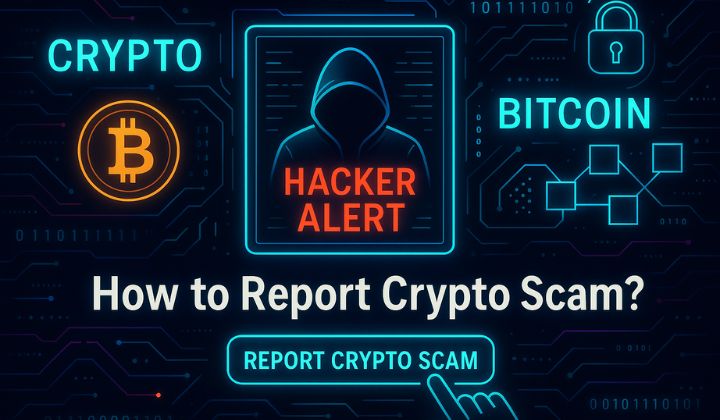Crypto Scam Reporting & Its Importance-
The digital currency boom introduced new methods for handling money but it simultaneously increased the occurrence of crypto scams. The process of reporting scams serves two essential purposes because it protects victims and maintains financial system integrity.
The process of reporting crypto scams serves what fundamental purpose? The police and regulators receive information through reporting which enables them to initiate swift investigations that result in account and digital wallet freezes. The speed of your scam report helps protect additional people from falling victim to the same deception.
The analysis of good reports by fraud detection groups using advanced technology from [cited] enables them to track patterns which enhances the security of crypto transactions. The collective effort of reporting scams creates a protective environment for everyone while strengthening crypto against its expanding threats.
The question is “How to report a crypto scam step by step?”
How to Report Crypto Scam: Step-by-Step Guide to Reporting a Crypto Scam
The need to fight crypto scams has reached a critical point. The international nature of these scams creates significant difficulties for investigators who want to track them down. The process of reporting these incidents leads to positive outcomes.
The reporting of scams enables law enforcement agencies and regulatory bodies to understand the situation so they can start taking action against scammers. The process of reporting scams enables authorities to freeze scam accounts and wallets which protects future victims from being targeted.
The first step to effectively report a crypto scam involves gathering all available evidence. The evidence collection process requires wallet addresses together with transaction IDs and all relevant communications.
The process of evidence collection serves as a crucial step because it creates a strong case for presenting to authorities.
The FBI Internet Crime Complaint Center (IC3) at www.ic3.gov accepts reports from victims of cryptocurrency scams and you can also contact your local FBI Field Office for assistance.
When reporting the transactions to the authorities provide them you should provide all available details about the transactions.
A visual guide which presents the evidence collection process followed by community awareness steps demonstrates the necessity of using a structured method to fight these types of scams.
How to Report a Fake Crypto Exchange?
Users need to report fake crypto exchanges to the proper authorities when they find out about or experience such scams.
Quick Steps to be taken:
- You need to save all relevant data which includes screenshots of messages and transaction IDs and wallet addresses and emails and website links.
- You should end all contact with the suspected scammer while also blocking their access.
- You should transfer your remaining cryptocurrency to a new wallet and enhance all account security measures including password protection.
- Users who experienced scams on authorized exchanges should submit their cases to the exchange support team.
Where to Report?
In India
- You can submit your complaint through the Cyber Crime Portal at cybercrime.gov.in or by contacting 1930. You should file an FIR at your local police station or cyber cell for reporting the incident.
- You can submit your complaint through the RBI Sachet portal which is located at sache.rbi.org.in.
- You should submit your complaint to SEBI when dealing with registered entities that are involved in the scam.
In the US
- You can file your complaint with the Federal Trade Commission by using reportfraud.ftc.gov.
- The FBI’s Internet Crime Complaint Center (IC3) accepts reports of cybercrimes including crypto scams through their website ic3.gov.
- Contact your state consumer protection agency or reach out to the Consumer Protection Bureau that serves your area.
In Europe
- You should contact the police department in your current country of residence.
- You can report scams to Action Fraud through their website actionfraud.police.uk.
- You should report broker scams to European regulators through the European Securities and Markets Authority (ESMA).
- You can visit Europol’s online portal to discover reporting channels for each member state but you should contact your local police department if there is no dedicated online reporting system.
Online Platforms
- Users can report wallet address and project scams through Chainabuse.com.
- Users can share scam information through CryptoScamDB.org.
- Users can report scams and check for scam alerts through Scamwatch.gov.au.
- Users need to share scam information on social media platforms that were used by scammers.
Key Considerations
- The process of recovering stolen cryptocurrency becomes extremely challenging because most transactions become permanent.
- The reporting process at official agencies allows victims to maintain their anonymity during scam investigations.
- Users need to remain alert to fake investment offers since they should always verify platform authenticity before making any financial commitments. [Link1]
Reporting Mechanisms for Cryptocurrency Scams in Different Regions
The success rate of cryptocurrency scam reporting depends on geographical location because various areas have different legal frameworks and systems for managing such scams.
Where to Report Cryptocurrency Scam in India?
Users can report scams through the Cyber Crime Portal in India but they also need to file FIRs with local police and reach out to regulatory bodies like RBI and SEBI.
The diverse approach enables both quick information collection and strengthens the overall stability of the financial system.
How to Report Cryptocurrency Scam to Police?
The National Cybercrime Helpline at 1930 accepts reports of crypto scams and you can also be reached through the National Cybercrime Reporting Portal (NCRP) for online complaint registration.
The registration process for a crypto scam report requires you to enter your name and mobile number and address and transaction information. The system lets you monitor your complaint status and enables you to reach out to State/UT Nodal Officers when the response does not meet your expectations.
Steps to Report a Crypto Scam
- Call the Helpline: Reach the National Cybercrime Helpline by dialing 1930. You can give information through the phone call.
- Register on the Portal: The National Cybercrime Reporting Portal can be accessed through cybercrime.gov.in.
- Register Your Details: The registration process requires your name and an Indian mobile number which will get an OTP for verification purposes.
- File the Complaint: Choose “Report Other Cybercrimes” followed by “financial fraud” or “cryptocurrency crimes” as your specific sub-category.
- Provide Details: Enter all required information including your personal data and home address and all transaction records.
- Keep the Acknowledgement Number: Note down the acknowledgement number which appears after complaint submission because you will need it to check your case status and reach out to authorities when necessary.
- Track Your Complaint: You can monitor your complaint status through the portal while reaching out to State/UT Nodal Officers for unsatisfactory responses.
Types of Information to Gather
- Transaction History: Check your crypto wallet applications (MetaMask or Trust Wallet) and crypto exchanges (Coinbase or Binance) for transaction records and sending addresses.
- Transaction Hash: The transaction hash allows users to access complete transaction information through block explorer sites including Etherscan.
- Scam-Related Information: Save all scam-related communications which include text messages and links and documents that were part of the scam. [Link2]
How to Report Crypto Scam to FBI IC3?
The United States provides three main reporting systems through the FBI’s Internet Crime Complaint Center (IC3) and the Securities and Exchange Commission (SEC) and the Federal Trade Commission (FTC) which direct reports to appropriate investigative units.
The complex system plays a vital role because swift action enables account freezes and defense system improvements.
A flowchart illustrating the scam identification process to authority notification should demonstrate how established reporting systems function to combat cryptocurrency fraud.
How to Report Crypto Scam to SEC FTC:

Image1. Framework of AI Agents for Fraud Detection
Best Agency to Report Crypto Scam:
| Region | Agency | Reporting Mechanism | Website | Contact Information |
| United States | Federal Bureau of Investigation (FBI) | Internet Crime Complaint Center (IC3) | https://www.ic3.gov | www.ic3.gov/PSA/2023/psa230824 |
| United States | Federal Trade Commission (FTC) | Consumer Complaint Portal | https://consumer.ftc.gov/avoiding-cryptocurrency-scam | |
| United States | Consumer Financial Protection Bureau (CFPB) | Consumer Complaint Database | https://www.consumerfinance.gov/about-us/newsroom/cfpb-publishes-new-bulletin-analyzing-rise-in-crypto-asset-complaints/ | |
| United States | South Carolina Department of Consumer Affairs (SCDCA) | Report a Scam | https://www.consumer.sc.gov/cryptocurrency-scams | |
| United States | Federal Bureau of Investigation (FBI) | Internet Crime Complaint Center (IC3) | https://www.ic3.gov/PSA/2023/psa230824 | |
| United States | Federal Bureau of Investigation (FBI) | Internet Crime Complaint Center (IC3) | https://www.ic3.gov/PSA/2023/psa230824 |
Reporting Mechanisms for Cryptocurrency Scams in Different Regions
Conclusion
The process of reporting crypto scams requires immediate action because it disrupts scam operations and protects additional victims from falling prey. The process of quick reporting enables authorities to disrupt scam operations while protecting other potential victims.
People can take control of the situation by understanding which reporting channels exist for scams across the U.S. and India. The FBI’s IC3 serves as the main reporting destination for U.S. citizens while the Cyber Crime Portal [cited] functions as the primary reporting point for Indian citizens.
The U.S. SEC and FTC operate as separate reporting bodies which enable people to submit various types of scams for comprehensive crypto crime prevention.
The flowchart demonstrates the correct method for collecting evidence and contacting exchanges through a systematic process.
Be cautious during digital transactions because any offer that seems too amazing to believe is most likely a scam. Digital transactions require constant attention from users. Vigilance is crucial.
References:
- Aggarwal, Shalini. ‘Insights in Banking Analytics and Regulatory Compliance Using AI.’ Rana, Sudhir, IGI Global, 4/25/2025
- Dylan Fairview. ‘Bitcoin and Cryptocurrency Made Easy.’ A Step-by-Step Guide to Understanding, Buying, and Profiting from Crypto – Secure Your Financial Future with Simple Strategies, Dylan Fairview, 12/7/2024
- DERRICK SEKIZIYIVU. ‘ROLE OF CRYPTO IN TRANSFORMING LIVES.’ Empowering People, Redefining Possibilities: The Global Impact of Cryptocurrency, Therrid Publishers, 5/29/2025
- Link1
- Link2
Image References:
- Image: Framework of AI Agents for Fraud Detection, Accessed: 2025. https://d3lkc3n5th01x7.cloudfront.net/wp-content/uploads/2024/08/01013705/AI-agents-for-fraud-detection.png
You need to login in order to Like





















Leave a comment